You know that feeling when a business seems to understand exactly what you need, right when you need it?
That’s not magic—it’s the power of AI.
In customer success, AI is shifting the game by helping businesses anticipate customer needs, offer tailored solutions, and build stronger, more meaningful relationships. Because let’s face it—getting a one-time customer is nice, but what really matters is turning them into repeat customers.
Customer success AI is not about replacing the human touch. It’s about giving teams the tools to focus on what really matters—building genuine connections with customers.
So, let’s dive in.
Boost your customer success results with the help of AI
Now, let’s fill in the dots between generative AI and customer success.
The growing role of AI in customer success
Artificial Intelligence (AI) is behind the sweeping disruption across the enterprise software industry—including in customer success. By nature and adoption, this technology is a problem solver and can significantly scale customer engagement online.
It uses a variety of AI-powered tools, which help customer success managers boost their efforts. This includes improving the user experience for everyone interacting with their brand, AI voice cloning for personalized communication, upselling effectively, ensuring good product adoption, and more.
When applied well, AI enables a wide range of capabilities, like precise data modeling, customer health score tracking, predictive churn trackers, increased revenues from sales teams, etc.
What’s most important here is that it pays off. Businesses that utilize AI see a significant 30% boost in customer retention. Your customers want instant help, so using an AI agent or automation features in your customer success strategy makes sure they don’t ditch your brand for a competitor.
Read more: Learn how companies that use agentic AI gain an advantage over direct competitors who don’t. Also, be sure to check out our full guide on agentic customer service.
How can customer success use AI?
AI gives CS teams a full breakdown of the customer data, enabling them to predict the client’s behavior and personalize engagement. This technology can also streamline customer onboarding, nurture loyal clients, and cross-sell related products to visitors.
Let’s look at some of the use cases.
Understanding your customers better
Agents can leverage AI systems to analyze large customer data sets from a variety of channels including emails, live chat, and CRM. This helps customer success (CS) teams to generate accurate customer profiles and provide valuable insights across different touchpoints.
How does it work? Machine learning algorithms analyze, interpret, and segment the data according to customer behavior. For example, a website visitor browsing for snorkeling equipment can trigger a targeted ad or a personalized email with products in line with their search, increasing the likelihood of purchase.
Did you know that…
A recent McKinsey study shows, 72% of shoppers use AI in one way or another.
Expanding your availability
By integrating AI-powered chatbots and virtual assistants into your website and messaging channels, your business can be there for the customers at any time of the day or night. Unlike human agents who are limited to certain working hours and time zones, AI assistants are available 24/7.
Moreover, studies show that 42% of customer service specialists believe AI chatbots play a significant role in resolving support-related inquiries. You can trust today’s self-service AI agents to talk to your customers while offline and maintain the same friendly, empathetic tone as your human support team.
Predicting churn and acting upon it more efficiently
Predictive analytics identify signals and patterns that indicate when a customer is likely to churn. So, looking at customer interactions and past data, AI can show you which customers might leave and help you take action to retain them. For example, a subscription service can use predictive analytics for customers planning to cancel their subscriptions.
As unimaginable as it seems, AI can analyze customer feedback, view patterns and usage data to flag clients who haven’t engaged with the platform recently. To prevent churn, your company can proactively send out personalized offers and discounts. And this is especially important as, according to Brain & Company, 67% of churn can be prevented.
Proactively communicating with shoppers
AI can help your brand with proactive, personalized communication by sending timely offers and helpful messages. These can be based on customer behavior, preferences, and even the time spent on certain pages of your site.
Since 53% of customers expect brands to anticipate their needs and act proactively, this will prove useful in the long run. You may not know when a customer is on your website, but your AI agent does. And in situations when answering a simple question about international shipping is the final deciding factor for a customer, this functionality will be directly related to your revenue boost.
Read more: Learn all about how using AI in customer communication can benefit you and your team.
Building stronger customer relationships
Using AI in customer success helps businesses build stronger customer relationships by enabling personalized experiences, proactive support, and 24/7 availability. This technology also analyzes customer data to deliver tailored recommendations, predict issues, and streamline onboarding with automated tutorials.
Most successful brands regard customer relationship building as a marathon rafter and a one-time sprint. So, you should learn from feedback and optimize your processes to encourage long-term trust and loyalty.
The best AI tools for customer success
The most effective CS tools are AI-powered. They streamline collaboration between digital and human agents, making the process as efficient as possible.
Below is a comparison table of the top five AI tools for customer success.
| Name | Rating | Free plan | Best for |
|---|---|---|---|
| Tidio | 4.7/5 ⭐️ | ✅ | Lyro AI Chatbot |
| Churnzero | 4.7/5 ⭐️ | ❌ | Dynamic content templates |
| HubSpot | 4.4/5 ⭐️ | ✅ | AI summaries |
| Zendesk | 4.3/5 ⭐️ | ❌ | Proactive messaging |
| Clientsuccess | 4.4/5 ⭐️ | ❌ | Automated playbooks |
And here are the detailed reviews of AI customer success platforms:
1. Tidio
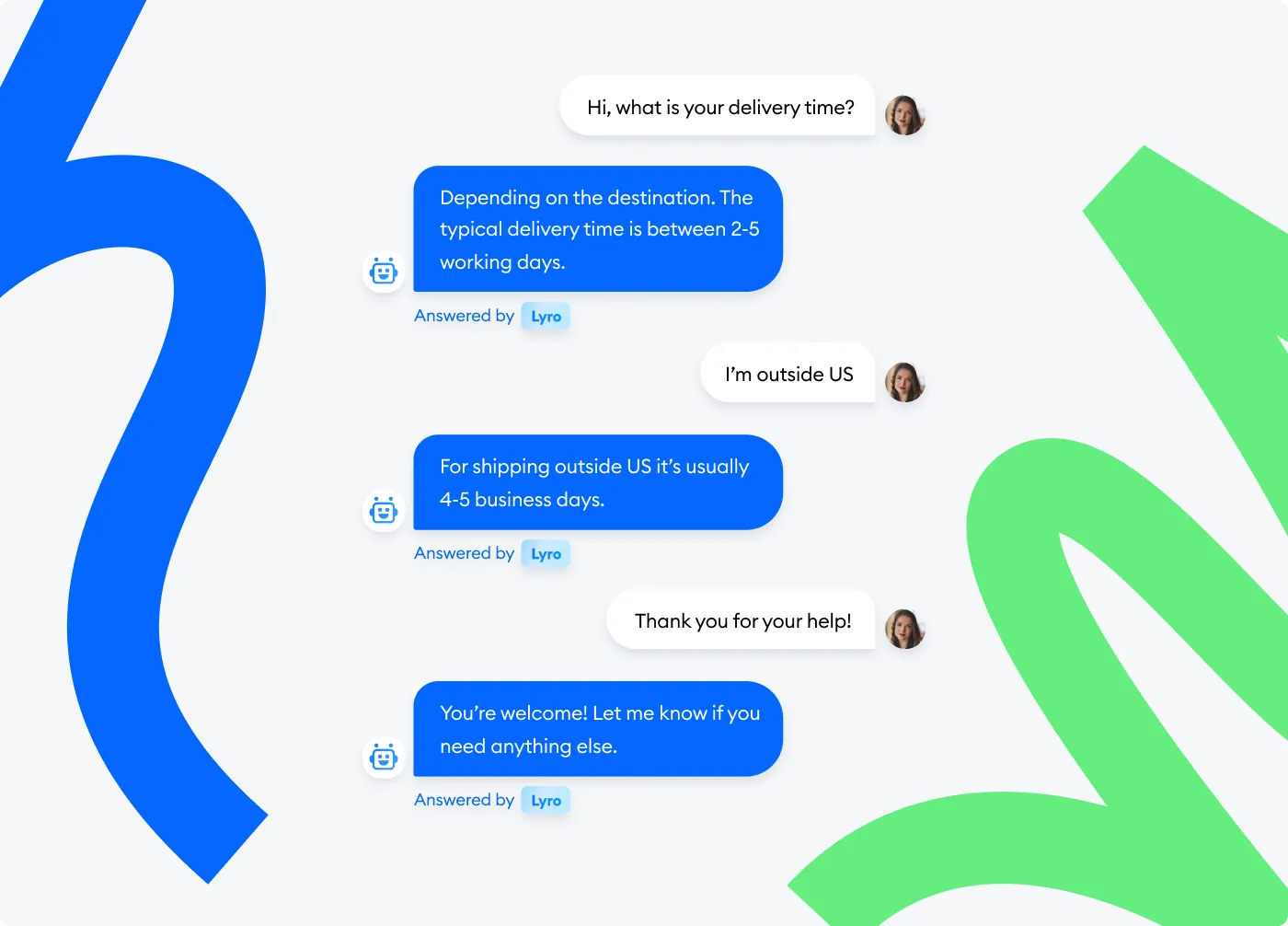
Rating: 4.7/5 ⭐️ (1,410+ reviews)
Tidio is a customizable, yet easy-to-use software. It leverages artificial intelligence to scale interactions between your brand and potential clients. This solution proactively engages users on your website with automated messages that help to reduce bounce rates, pre-empt support inquiries, and guide the customer journey until checkout.
Moreover, a mix of conversational AI in the form of virtual assistants running on NLP (natural language processing) technology helps to interpret and understand the meaning of user inputs. At the same time, machine learning gathers this data to make the responses even more accurate.
Main features:
- Lyro AI Chatbot
- Chat flows
- Canned responses
- Helpdesk automations
- Automated ticket routing
Pricing:
- 7-day free trial available
- Free version available
- Starter ($24.17/mo)
- Growth (starts at $49.17/mo)
- Plus (starts at $749/mo)
- Premium (starts at $2999/mo)
Read more: Discover how Wulff Beltton improved its customer satisfaction rating by switching to Tidio.
2. Churnzero
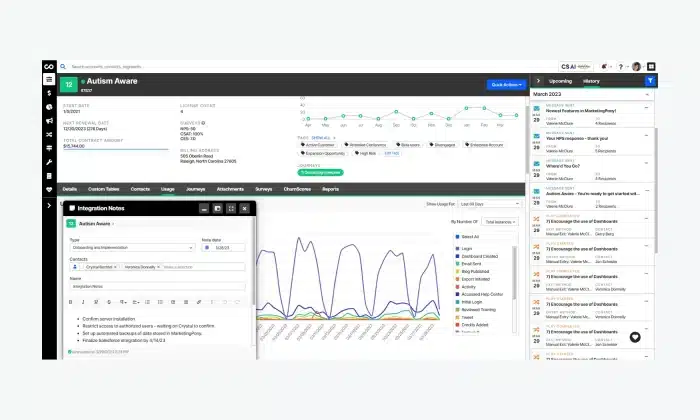
Rating: 4.7/5 ⭐️ (1330+ reviews)
Churnzero is highly recommended for SaaS companies with subscription-based models searching for solutions that reduce customer churn. This system provides customer health scoring to automate how client engagements are prioritized, improving overall retention. It conducts customer usage during onboarding by looking into product usage to identify early challenges in targeting new buyers. Moreover, customer success managers would find the dynamic content templates, playbooks, profiles, and tools helpful for their workflows.
Pros:
- Proactive churn prevention
- Dynamic content templates
- Customer profiles
Cons:
- Limited multilingual options
- Limited customization of customer segmentation
- Pricing available upon request
3. HubSpot
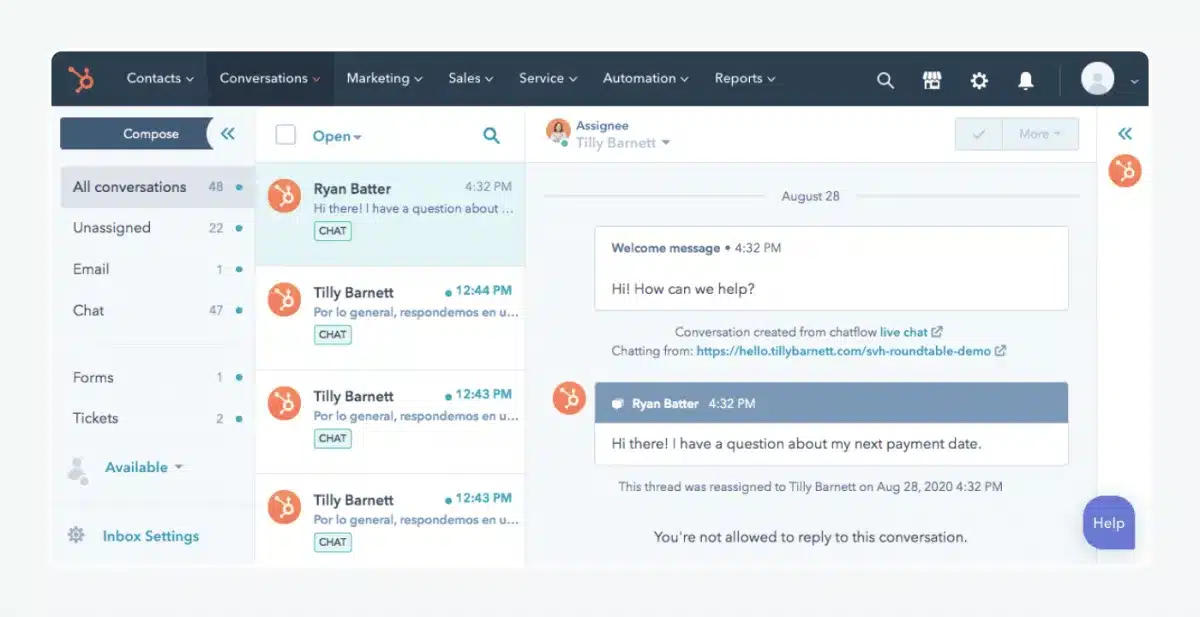
Rating: 4.4/5 ⭐️ (12,240+ reviews)
HubSpot is a user-friendly customer success management software. The Service Hub includes tools like a support tickets tracker, knowledge base, live chat, and customer feedback features. On top of that, HubSpot CRM stores all information about customers in one place, leveraging automation and other administrative tasks. This software helps brands generate high-quality leads by communicating links from call-to-action buttons, joining webinars, and accessing downloadable assets.
Pros:
- Omnichannel customer service
- Conversation summaries
- AI knowledge base
Cons:
- Frequent disruptive updates
- Issues with CRM data integration
- Free version available
- Starter ($20/mo/seat)
- Professional Customer Platform ($1,180/mo)
- Enterprise Customer Platform ($3,910/mo)
Read more: Explore the best HubSpot alternatives available on the market today.
4. Zendesk
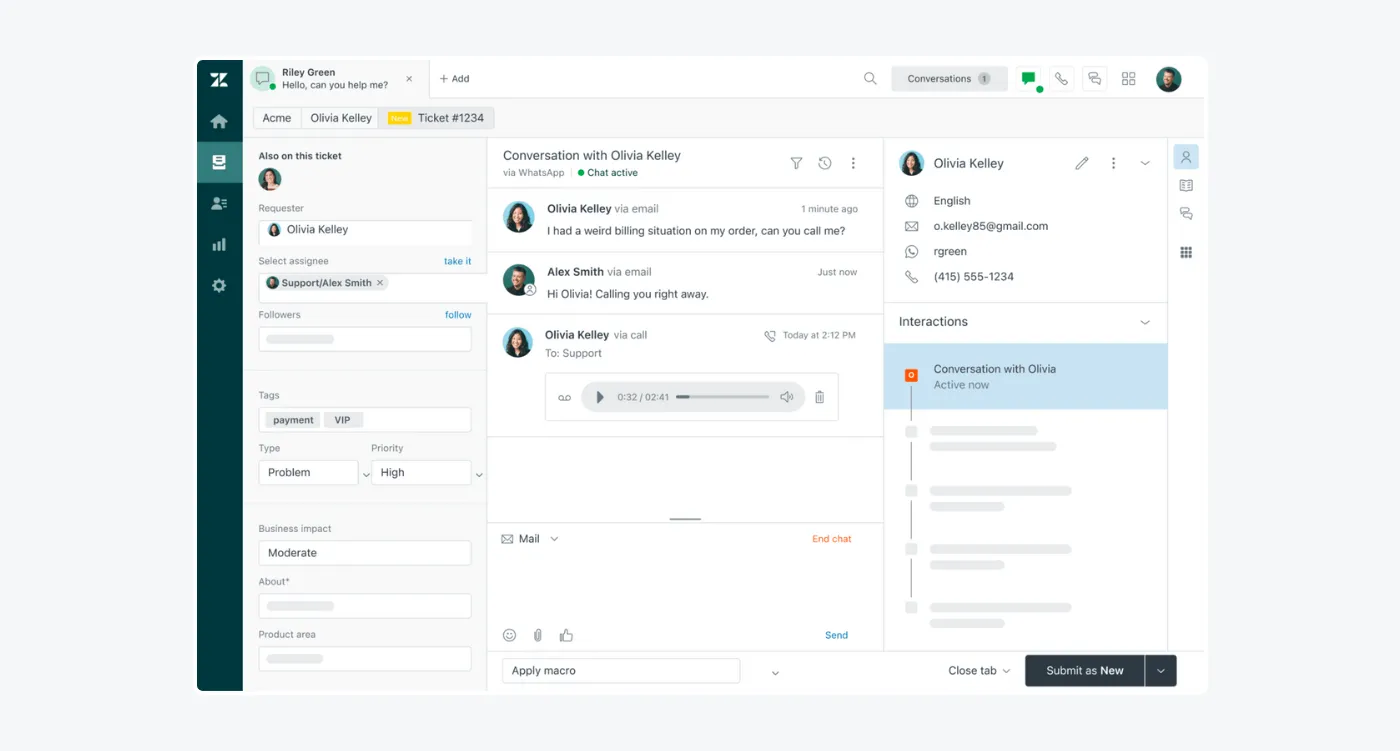
Rating: 4.3/5 ⭐️ (5,910+ reviews)
Zendesk is a live chat solution for real-time customer support and engagement. It helps customer success managers stay organized by tracking interactions on the ticketing system dashboard and regularly collecting customer reviews or sending follow-ups. Moreover, this software provides proactive messaging such as discount codes and exclusive offers that can be targeted to new or returning customers. Meanwhile, Zendesk’s AI agent can utilize the knowledge base and conversation history to resolve user issues across the customer journey.
Pros:
- Multichannel support
- Centralized workspace
- Proactive chat messaging
Cons:
- Steep learning curve
- Delayed support
- Support Team ($19/mo/agent)
- Suite Team ($55/mo/agent)
- Suite Growth ($89/mo/agent)
- Suite Professional ($115/mo/agent)
- Suite Enterprise → Contact sales
Read more: Discover the best Zendesk alternatives with pros, cons, and pricing compared.
5. ClientSuccess
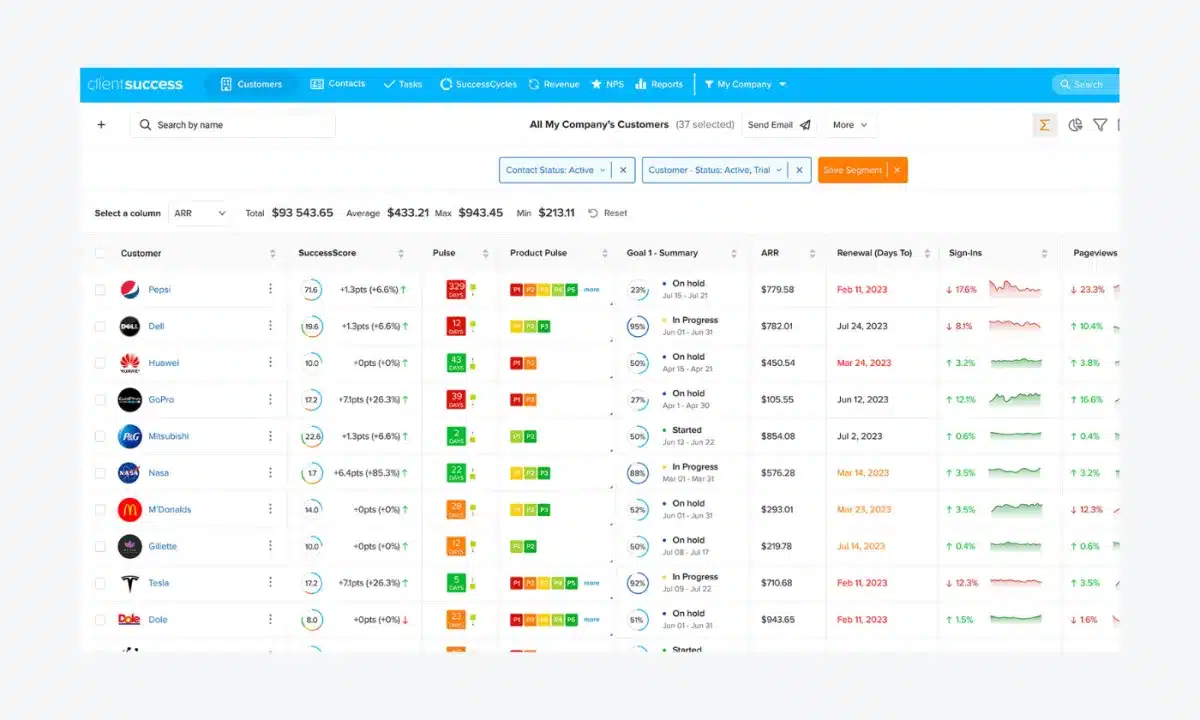
Rating: 4.4/5 ⭐️ (415+ reviews)
ClientSuccess is a one-stop for client communications. This platform generates comprehensive customer health scores from data spread across the CRM, survey tool, email, and product usage metrics. It also provides a customer journey mapping across the onboarding, adoption, and renewal steps that can be better coordinated. This system gives the CSMs a way of identifying pain points early and notifying the support teams to act fast, preventing potential churn. On top of that, this software offers features that give a quick snapshot of a customer’s overall health and engagement.
Pros:
- Automated playbooks
- Customer health scoring
- NPS surveys
Cons:
- Limited NPS survey
- Onboarding complexities
- Startup Package → contact sales
- Growth Package → contact sales
- Enterprise Package → contact sales
Pick the right AI solution for customer success
Choosing AI software for customer success involves asking key questions. You also need to define objectives and key performance indicators (KPIs) like churn rate and customer lifetime value. Scaling customer success as your business grows can be both expensive and complicated, so finding a solution that automates the customer experience is a must.
Tidio meets the mark.
Lyro AI, its top feature, automates the back-and-forth interactions between your business and the customers. Moreover, predictive analytics will pick out areas of dissatisfaction early and alert the agents. You can also automate your helpdesk, ticketing system, and all the repetitive tasks your CSMs are wasting their time on.
Take Tidio for a spin today and see how it can elevate your customer success strategy.
Try Tidio’s newest AI technology

